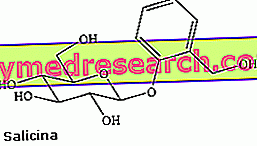LYBELLA ® is a drug based on ethinyl estradiol + Clormadinone acetate
THERAPEUTIC GROUP: Systemic hormonal contraceptives - Progestin and estrogens, fixed combination
IndicationsAction mechanismStudies and clinical effectiveness Usage and dosage instructionsWarnings Pregnancy and lactationInteractionsContraindicationsUndesirable effects
Indications LYBELLA ® - Ethinyl estradiol + Clormadinone
LYBELLA ® is used as an oral contraceptive.
Mechanism of action LYBELLA ® - Ethinyl estradiol + Clormadinone
LYBELLA ® is a fairly recent contraceptive, placed on the Italian market with a clear delay compared to France and Germany.
Although the mechanism underlying the contraceptive effect is practically identical to that of other older drugs, therefore based both on the inhibitory action of the hypothalamic-pituitary-ovary axis necessary to inhibit ovulation, and on the chemical-physical variations on load of cervical mucus, useful to prevent spermatozoa from rising in the female genital tract, LYBELLA ® has assumed particular importance due to the presence of an innovative synthetic progestogen such as chlormadinone, characterized by a marked antiandrogenic action.
This property, guaranteed by the induction of SHBG expression and by the inhibition of 5 alpha-reductase, prevents the appearance of some particularly significant side effects related to hormonal contraception such as acne, hirsutism and alopecia, thus increasing the tolerability of the therapy.
Studies carried out and clinical efficacy
1. EFFECTIVENESS AND SAFETY OF CLORMADINONE-BASED CONTRACEPTIVES
Extensive study conducted on over 60, 000 women subjected to hormonal contraception with clomradinone and ethinyl estradiol. Overall, the use of these contraceptives was particularly effective and well tolerated, counting exclusively only six cases of thromboembolic events, equal to an incidence of 2.4 per 10, 000 women / year.
2. ETINYLESTRADIOL / CLORMADINONE AND SKIN DISTURBANCES
Work conducted on women with polycystic ovary syndrome with acne and idiopathic hirsutism. In these cases the administration of oral contraceptives based on chlormadinone, in addition to ensuring the contraceptive effect, has proved useful in improving acne, seborrhea and hirsutism even in patients with regular cycles.
3. ETHINYLESTRADIOL / CLORMADINONE AND HYPERANDROGENISM
Study demonstrating that the use of oral contraceptives based on ethinyl estradiol and chlormadinone may be useful in non-obese women suffering from polycystic ovary syndrome in improving the symptoms of hyperandrogenism without interfering with body composition and carbohydrate metabolism.
Method of use and dosage
LYBELLA ® ethinyl estradiol-coated tablets of 30 mcg and 2 mg of chlormadinone acetate:
the dosage scheme of LYBELLA ® follows at the same pace as that of the most widely used oral contraceptives.
In fact, it is characterized by a period of daily intake for 21 consecutive days, punctuated by periods of suspension lasting about a week, in which one should see the appearance of suspension bleeding similar to the physiological menstruation.
The maximum contraceptive coverage is observed during the middle of the second treatment cycle, while it decreases already 36 hours after taking the last tablet to disappear completely after about 7 days, given the resumption of the physiological hormonal control.
Changes in the normal dosing schedule may be necessary in the case of recent pregnancies or abortions, changes in the contraceptive used or in case of forgetfulness.
Warnings LYBELLA ® - Ethinyl estradiol + Clormadinone
The intake of LYBELLA ® must necessarily be preceded by a careful medical-gynecological examination useful in assessing both the prescriptive appropriateness and the possible presence of conditions capable of increasing the incidence of adverse reactions.
In fact, the presence of coagulation disorders, cardiovascular pathologies, neoplastic pathologies, liver and kidney diseases, neurological and psychiatric disorders and metabolic pathologies such as diabetes and predisposing conditions such as obesity or smoking, could significantly increase the risk of adverse events clinically relevant.
Consequently in these cases a careful evaluation of the cost / benefit ratio would be necessary and possibly also a periodic monitoring of the patient's overall health status, with particular attention to the coagulation framework.
LYBELLA ® contains lactose so that its intake in patients with lactase enzyme deficiency, glucose / galactose or lactose intolerance, may be associated with severe gastrointestinal disorders.
PREGNANCY AND BREASTFEEDING
The use of oral contraceptives such as LYBELLA ® during pregnancy is contraindicated given both the futility and the absence of a complete characterization of the safety profile of these hormones on fetal health.
The contraindications also extend to the next stage of breastfeeding given the ability of ethinylestradiol and chlormadinone to pass through the breast filter and concentrate in breast milk.
Interactions
The liver cytochrome p450 enzymes, responsible for the metabolism of both active ingredients, are particularly susceptible to the action of different enzymatic modulators such as rifampicin, phenytoin, barbiturates, antiretrovirals, antibiotics and herbal remedies such as St. John's wort.
The inducing action of these active ingredients could in fact determine a significant reduction in the blood concentrations of ethinyl estradiol and chlormadinone, thus lowering the contraceptive efficacy of LYBELLA ®
In these cases, therefore, before undertaking the concomitant intake of other active ingredients, it would be useful to inform your doctor and foresee the need for contraceptive methods of coverage.
Contraindications LYBELLA ® - Ethinyl estradiol + Clormadinone
LYBELLA ® is contraindicated in case of current or previous venous thrombosis, stroke, hypertension, metabolic pathologies such as diabetes mellitus, hypertension and dyslipidemia, alterations of liver and kidney function, malignant pathologies, neuro-psychiatric disorders, motor disorders, undiagnosed gynecological disorders and in case of hypersensitivity to the active ingredient or to one of its excipients.
Undesirable effects - Side effects
Although one of the main objectives of LYBELLA ® was to reduce the side effects of hormonal contraception, several clinical trials and postmarketing studies have shown, with some frequency, the appearance of side effects such as increased breast tension with tenderness, headache and dizziness, nausea and vomiting, weight gain, depression and fatigue.
The increased risk of embolic, cardiovascular and neoplastic thrombus events remains to be clarified in statistical terms.
Note
LYBELLA ® is salable only under medical prescription.



